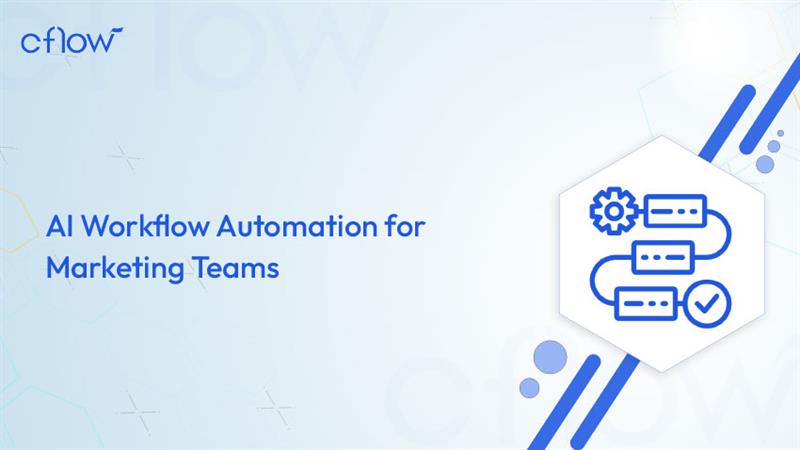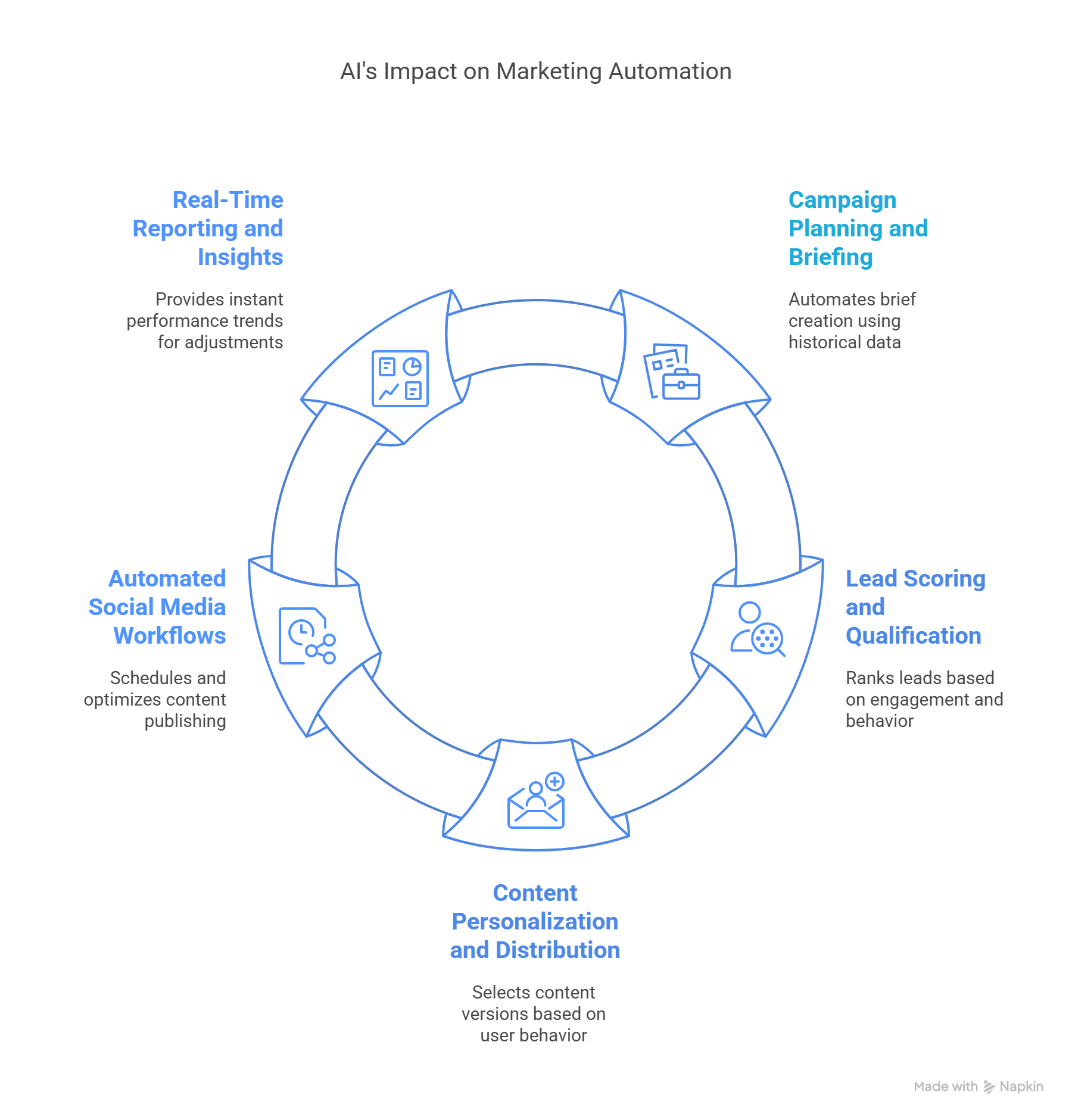AI Workflow Automation Matters for Marketing Teams

Key takeaways
- AI workflow automation enables marketing teams to reduce manual workload and speed up execution.
- From lead scoring to content distribution, AI brings consistency, efficiency, and measurable ROI.
- Intelligent automation helps teams focus on creativity and strategy while AI handles the execution and data.
- Platforms like Cflow let marketing teams build automated, no-code workflows tailored to campaign needs.
Marketing teams today face an overwhelming mix of deadlines, channels, and customer demands. With shrinking timelines and rising expectations, efficiency isn’t just helpful—it’s critical. Teams can’t afford to be bogged down by manual processes when real-time agility is the new standard.
AI-driven automation is redefining how marketing teams operate—cutting costs, boosting campaign speed, and improving personalisation. As workflows grow more complex, automation ensures performance never slows down.
88% of marketers now use AI in their daily operations, highlighting how widespread AI adoption has become in marketing.
In this blog, we explore how AI workflow automation helps marketing teams streamline operations, increase ROI, and stay competitive in a fast-moving digital environment.
Why AI Workflow Automation Matters for Marketing Teams
Today’s marketers juggle content creation, multichannel distribution, lead nurturing, analytics, and stakeholder reporting—often with lean teams and tight timelines. Manual coordination across these tasks leads to bottlenecks, inconsistencies, and lost opportunities. Fragmented communication between departments and lack of process standardisation often delays campaign execution and drains creative energy.
AI-powered workflow automation transforms how marketing teams operate by:
- Eliminating repetitive tasks like follow-up emails, list segmentation, and asset routing—freeing up bandwidth for creative strategy.
- Speeding up approvals and campaign launches through automated task routing and predefined workflows that remove manual dependencies.
- Enhancing lead qualification with AI-based scoring models that learn from customer engagement and purchase behaviour.
- Providing predictive analytics to optimise timing, content formats, and channel allocation for maximum campaign impact.
By integrating AI into workflow systems, teams gain both agility and precision. They can launch campaigns faster, iterate based on live data, and maintain consistent messaging across every touchpoint—all while reducing operational friction.
76% of companies using marketing automation report positive ROI within the first year.
Key Use Cases of AI in Marketing Workflow Automation
From campaign briefing to real-time analytics, AI is revolutionising every stage of the marketing workflow. Below are practical use cases where AI delivers measurable impact by improving speed, accuracy, and personalisation—freeing up teams to focus on strategy and creative thinking.
1. Campaign Planning and Briefing Automation
AI can auto-fill campaign briefs using historical data and past performance. This helps standardise creative briefs and reduces back-and-forth between content, design, and strategy teams.
2. Lead Scoring and Qualification
AI-based models analyse engagement, demographics, and behaviour to rank leads. Marketing and sales teams can then prioritise high-intent leads and automate nurture sequences for the rest.
3. Content Personalisation and Distribution
AI tools dynamically select which version of an email, ad, or webpage to show based on user behaviour, increasing engagement without manual segmentation.
4. Automated Social Media Workflows
AI platforms schedule, repurpose, and optimise content publishing across platforms. Natural language models even help generate captions and hashtags.
5. Real-Time Reporting and Insights
AI-driven dashboards surface key performance trends instantly, helping marketers adjust live campaigns and demonstrate ROI.
Benefits of AI Workflow Automation for Marketing Teams
Marketing automation leads to a 14.5% increase in sales productivity and a 12.2% reduction in marketing overhead. AI workflow automation goes beyond efficiency—it drives measurable impact across the marketing lifecycle.
From faster campaign launches to improved cross-team alignment, the benefits are both strategic and operational.
1. Time-to-Market
AI-driven workflows reduce dependency on manual coordination and enable teams to launch campaigns faster—keeping pace with market trends and competitors.
2. Operational Consistency
With predefined rules and automation logic, marketing tasks like approvals, follow-ups, and segmentation are executed consistently, reducing human error.
3. Real-Time Optimisation
AI learns from campaign performance metrics and adjusts delivery times, messaging, or audience targeting—helping teams course-correct while campaigns are live.
4. Resource Efficiency
Automation frees up marketers from repetitive, low-impact tasks, allowing them to focus on creative strategy, storytelling, and experimentation.
5. Improved Cross-Team Collaboration
AI platforms help unify task management, messaging updates, and analytics between marketing, design, and sales—ensuring alignment across departments.
End-to-end workflow automation
Build fully-customizable, no code process workflows in a jiffy.
Best AI Tools for Marketing Workflow Automation
Marketing teams rely on specialised tools to execute AI automation effectively—tools that support everything from audience targeting and lead nurturing to content creation and campaign analysis.
1. Cflow
A no-code AI workflow automation platform, Cflow is ideal for marketing teams looking to streamline campaign planning, asset approvals, lead routing, and performance tracking. It integrates easily with CRMs, email platforms, and analytics tools, allowing marketers to build automated workflows without writing code.
Key Features:
- Drag-and-drop builder
- Visual workflow designer
- CRM/email/API integrations
- Role-based task assignments
- Centralised campaign dashboards
Pros:
- User-friendly interface
- Highly customisable
- Excellent customer support
- No coding skills required
Cons:
- Limited features in the basic plan.
Limited advanced analytics compared to enterprise BI tools; initial setup requires structured workflow planning.
2. HubSpot
Known for its all-in-one marketing platform, HubSpot uses AI to power lead scoring, email personalisation, and predictive recommendations, helping marketers engage audiences more effectively.
Key Features:
- AI-driven CRM
- Smart email scheduling
- Adaptive content tools
- Predictive lead scoring
- Integrated analytics dashboard
Pros:
- Scalable for businesses of all sizes
- Excellent documentation and support
- Strong integration ecosystem
Cons:
- Can become expensive at scale
- Complexity increases with advanced features
3. Marketo (Adobe)
This platform excels at automating complex customer journeys, offering AI capabilities for campaign management, A/B testing, and account-based marketing.
Key Features:
- Customer journey builder
- Real-time personalisation
- Adaptive nurturing
- AI-powered content scoring
Pros:
- Powerful automation and segmentation tools
- Deep integration with Adobe ecosystem
Cons:
- Steep learning curve
- Best suited for enterprise-level users
4. ActiveCampaign
A favourite among small-to-mid-sized businesses, it offers AI-driven email automation, CRM syncing, and customer journey mapping.
Key Features:
- Predictive sending
- Contact scoring
- Visual journey designer
- Omnichannel messaging
Pros:
- Affordable pricing
- User-friendly interface
- Flexible automation options
Cons:
- Limited design customisation
- Reporting features could be more robust
5. Jasper AI:
Ideal for content teams, Jasper leverages GPT-based AI to generate SEO-friendly content, social media captions, and email copy that resonates with diverse audiences.
Key Features:
- Content templates
- Tone and voice control
- SEO mode
- Collaboration tools
Pros:
- Easy to use
- Produces high-quality content quickly
- Supports multiple languages
Cons:
- No built-in plagiarism checker
- Requires human review for final edits
6. Copy.ai
Similar to Jasper, Copy.ai helps marketers write copy for ads, blogs, and landing pages at scale, using AI to learn from tone and performance data.
Key Features:
- Campaign copy generator
- Blog wizard
- Tone analyser
- Product description builder
Pros:
- Quick output
- Useful for ideation
- No credit card required for free plan
Cons:
- Less flexible for long-form content
- Outputs need fact-checking
7. ChatGPT for Marketing
Used for campaign ideation, audience targeting prompts, and real-time content generation—especially when integrated with other tools.
Key Features:
- Prompt-based content generation
- Natural language interaction
- Use in chatbots or creative writing tasks
Pros:
- Highly flexible
- Works across use cases
- Integrates with numerous platforms via API
Cons:
- Not built specifically for marketing
- Limited memory/context in standalone use
Integrating these tools into a unified tech stack—with analytics platforms like Google Data Studio or Tableau—creates a cohesive, performance-driven marketing engine that’s scalable and insight-led.
Challenges to Consider in AI Marketing Automation
Despite the benefits, AI implementation isn’t without challenges. Many marketing teams underestimate the complexity of rolling out AI-driven workflows, especially in organisations with siloed departments or outdated infrastructure. Below are the major hurdles to anticipate:
Data Privacy:
AI systems often process large volumes of customer data. Ensuring GDPR compliance and following local data protection regulations is essential. Teams must build data governance frameworks and monitor how personal data is used.
Integration Limitations:
Legacy marketing systems may lack API compatibility or offer limited support for real-time data exchange. This slows down deployment and restricts functionality. Choosing AI platforms with low-code connectors can help bridge this gap.
Over-Automation Risks:
Excessive automation can make marketing feel robotic or impersonal. It’s crucial to strike a balance between automation and authentic human interaction—especially in areas like customer service, brand storytelling, and creative production.
Team Resistance and Skill Gaps:
Introducing AI may spark concerns about job displacement or create friction due to a lack of familiarity with new systems. Training and clear communication about AI’s supportive role are critical to building trust.
Acknowledging and addressing these hurdles early leads to smoother AI adoption, long-term team buy-in, and greater marketing effectiveness.
Best Practices for Implementing AI in Marketing
Implementing AI in marketing isn’t just a tech decision—it’s a strategic shift in how campaigns are planned, launched, and optimised. These best practices will help ensure that AI is adopted effectively and delivers sustainable results:
- Start with one high-impact use case: Choose a workflow that shows clear, measurable value quickly—like lead scoring, email automation, or content scheduling. Quick wins build momentum and team confidence.
- Clean and centralised marketing data: AI models require clean, structured data to function effectively. Consolidate your data across CRMs, analytics tools, and ad platforms to eliminate silos and improve accuracy.
- Choose flexible platforms with integrations: Select AI tools that integrate easily with your existing tech stack—CRM, CMS, analytics, and project management tools. No-code platforms like Cflow make it easier to design, launch, and scale without heavy IT support.
- Invest in internal training: Upskill your marketing team to use AI tools confidently. Training builds AI literacy and helps users collaborate better with data scientists or automation specialists.
- Define KPIs and iterate often: Establish clear success metrics—like reduction in manual hours, time-to-campaign, or lead conversion rates. Use these KPIs to monitor and continuously refine your workflows.
Following these practices ensures a smoother rollout, reduces resistance to change, and maximises both short-term wins and long-term ROI.
The Future of AI Workflow Automation in Marketing
AI in marketing is evolving rapidly—and the next wave is focused on deeper personalisation, cross-channel orchestration, and predictive intelligence. Marketing teams can expect:
- Increased Use of Predictive Analytics: AI will anticipate customer behaviour, enabling marketers to engage prospects proactively and optimise campaigns before performance dips.
- Hyper-Personalised Experiences: Advanced segmentation and real-time customisation will create one-to-one experiences at scale—based on user preferences, browsing history, and engagement data.
- Voice and Visual Search Integration: With voice assistants and camera-based search on the rise, AI will help marketers optimise content for new search behaviours.
- AI-Generated Video and Dynamic Content: Video content powered by AI will allow brands to create personalised visual campaigns without heavy manual production.
- Autonomous Campaign Execution: AI tools will begin to handle entire campaign cycles—from A/B testing to optimisation—freeing marketers to focus on brand, messaging, and innovation.
As automation grows more sophisticated, marketing teams that embrace AI now will be better positioned to outperform competitors, reduce costs, and build stronger customer loyalty in the years ahead.
Conclusion
The global marketing automation market is expected to grow from approximately £4.5 billion in 2024 to over £11.6 billion by 2031, at a CAGR of 12.55%.
AI workflow automation is redefining what’s possible for marketing teams. It enables faster execution, data-driven decisions, and a consistent brand voice—without overwhelming human resources. By adopting platforms like Cflow, marketing teams can modernise their operations, focus on strategy, and drive better results at scale.
Start your free trial of Cflow and see how AI-powered workflow automation can transform your marketing engine.
FAQs
1. What is AI workflow automation in marketing?
AI workflow automation in marketing uses artificial intelligence to automate repetitive tasks like lead scoring, email routing, and performance tracking. It enables real-time decisions and personalisation at scale, reducing manual workload and boosting campaign speed.
2. How can AI improve marketing performance?
AI helps marketing teams deliver timely, personalised content by analysing behaviour and engagement data. It also speeds up execution, reduces errors, and optimises campaign strategies using predictive analytics.
3. Will AI replace marketers?
No. AI enhances marketing operations but doesn’t replace human creativity and strategic decision-making. It automates routine processes so marketers can focus on storytelling, branding, and campaign strategy.
4. What are the best tools for AI marketing workflow automation?
Platforms like Cflow, HubSpot, Marketo, and Jasper offer robust AI features—from automation builders to content generation. Choosing the right tool depends on team size, workflow complexity, and existing tech stack.
5. How do I get started with AI in marketing?
Begin with one high-impact use case, such as lead qualification or campaign approvals. Use no-code platforms like Cflow to design your workflow, measure results, and scale gradually across the marketing funnel.
Thanks for reading till the end. Here are 3 ways we can help you automate your business: Create workflows with multiple steps, parallel reviewals. auto approvals, public forms,
etc. to save time and cost. Get a 30-min. free consultation with our Workflow expert to optimize
your daily tasks. Explore our workflow automation blogs, ebooks, and other resources to master
workflow automation.What should you do next?

Do better workflow automation with Cflow

Talk to a workflow expert

Get smarter with our workflow resources
Get Your Workflows Automated for Free!


